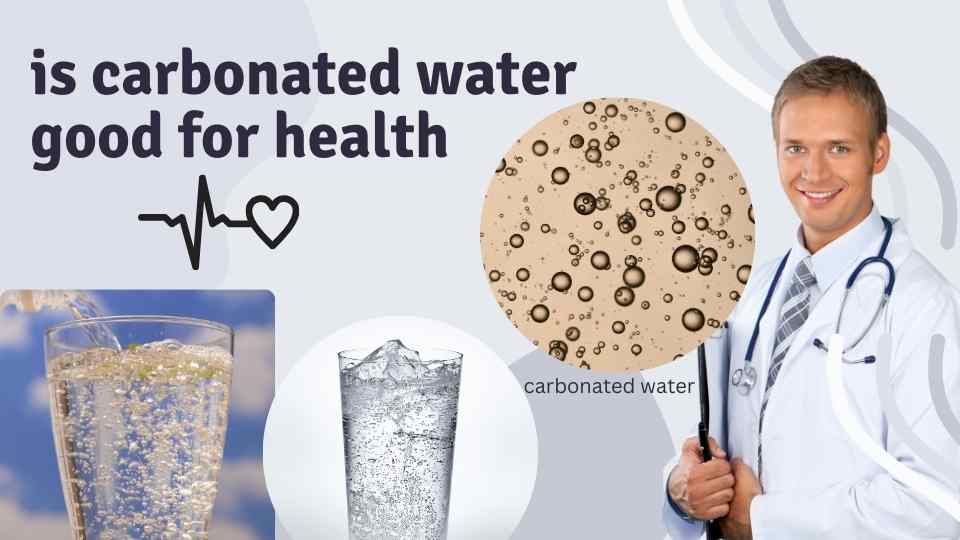is carbonated water good for health : For generations, carbonated water, known as soda or seltzer water, has delighted as a refreshing beverage. Its purported health benefits have intrigued many, yet scientific evidence regarding its impact on health remains somewhat ambiguous. This article aims to delve into and assess the diverse viewpoints surrounding the potential health advantages and drawbacks of carbonated water.
Introduction to Carbonated Water
Definition and production process
Sparkling water, also known as carbonated water, undergoes a process where carbon dioxide gas is infused under pressure into water. Typically non-alcoholic, it can be flavored with various additives like fruits or plants.
This beverage has a rich history, dating back thousands of years and was particularly popular in ancient Rome. Studies have suggested several benefits, such as improved digestion and relief from constipation, particularly for individuals with Irritable Bowel Syndrome (IBS). The bubbles present in carbonated water inhibit bacterial growth in the gut, which can be advantageous for those with IBS.
However, there are downsides to consider. Consumption of carbonated water may lead to bloating and gas, exacerbating discomfort and symptoms associated with IBS. Individuals with severe IBS are cautioned against its consumption due to the potential for cramps and abdominal pain.
Despite these drawbacks, sparkling water offers a low-calorie alternative to sugary sodas and serves as a versatile base for various beverages, including fruit-infused mixes and cocktails.
It’s crucial to recognize that sparkling water, like any other beverage, can contain impurities if not properly filtered. Choosing brands that utilize purified water and undergo rigorous testing for contaminants is advisable.
In conclusion, while sparkling water boasts several benefits, it’s essential to acknowledge its potential drawbacks and incorporate it wisely into one’s diet. Moderation and opting for brands with lower carbon dioxide levels can help mitigate bloating and gas issues associated with its consumption.
What is carbonated water?
Carbonated water is created by infusing water with carbon dioxide gas under pressure, resulting in a bubbly beverage commonly known as sparkling water, club soda, soda water, seltzer water, or fizzy water. Except for seltzer water, carbonated waters typically have salt added to enhance flavor, with occasional inclusion of other minerals in small amounts.
In contrast, natural sparkling mineral waters like Perrier and San Pellegrino are sourced from mineral springs, often containing minerals and sulfur compounds, in addition to carbonation.
Tonic water, another variant of carbonated water, contains quinine, a bitter compound, along with sugar or high-fructose corn syrup.
Types of carbonated water
Carbonated water, also referred to as sparkling water or seltzer water, undergoes a process of carbonation, resulting in its characteristic fizzy appearance. Regarding its impact on health, various sources offer differing perspectives:
According to an article from the University of Chicago Medicine, both natural and artificial carbonated water poses no harm to dental health or stomach acidity. However, it falls short in providing adequate hydration, hence moderate consumption is advisable.
Contrarily, a nutritionist from Healthline suggests that carbonated water isn’t inherently problematic and can serve as a beneficial substitute for sugary beverages.
Another Healthline article compared carbonated water with tonic water, offering recommendations on preference between the two, a stance that might not be universally favorable.
In summary, carbonated water isn’t inherently detrimental to health. However, its limited hydrating properties and the scarcity of long-term research make it challenging to ascertain potential risks associated with excessive consumption. As with all consumables, moderation remains essential.
The contradictory nature of available information on the topic complicates drawing definitive conclusions.
1 carbonated water advantages
According to research findings, carbonated water, also known as sparkling water, is often regarded as a healthier alternative to soda, which is associated with adverse effects like weight gain and dental issues.
One potential health benefit of sparkling water is its aid in digestion. The carbon dioxide present can assist in breaking down food, reducing bloating, and easing indigestion. Some individuals also report relief from upset stomachs after consuming sparkling water.
However, while sparkling water can be beneficial for digestion and generally doesn’t trigger Irritable Bowel Syndrome (IBS), it may induce bloating and gas symptoms, potentially exacerbating IBS flare-ups in individuals sensitive to carbonated beverages.
In summary, compared to soda, the negative repercussions of which are well-documented, opting for sparkling water is often viewed as a wiser choice for overall health. Nonetheless, excessive consumption of carbonated beverages, including sparkling water, can lead to discomfort such as burping and bloating. Therefore, moderation is key to enjoying its potential benefits while minimizing adverse effects.
2 carbonated water advantages
Gut irritation: Consuming carbonated water, particularly when combined with alcohol, can lead to discomfort and gastrointestinal issues.
Gas and bloating: The carbonation present in sparkling water may induce gas and bloating in certain individuals. Those who are sensitive to carbonated beverages may find it beneficial to steer clear of them entirely.
Tooth decay: Although sparkling water lacks the sugar content of sugary drinks, excessive consumption can still contribute to tooth decay over time. It’s essential to moderate intake to mitigate this risk.
Read More Blog Posts HERE
Subscribe to My whatsapp Channel HERE

